Don't wanna be here? Send us removal request.
Text
Customized Crypto Token Development Solutions for All Blockchain Platforms
Create tailored crypto tokens for your business with our expert development services. We deliver customized solutions compatible with leading blockchain platforms, ensuring secure and efficient token functionality. Empower your brand with innovative token technology!
To learn more, visit our website: https://lbmsolutions.in/crypto-coin-development-services/
0 notes
Text
Types of Tokens in Blockchain
What is a Crypto Token?
A crypto token is a digital asset on a blockchain network, representing value or utility. Built on platforms like Ethereum or Binance Smart Chain, tokens facilitate transactions, investments, and service access, and can be traded and stored in digital wallets.
The development process includes conceptualization, smart contract development, design, and compliance, followed by security audits and ongoing maintenance. This enables the creation of customized tokens, driving innovation within decentralized ecosystems.
In Blockchain technology has revolutionized the digital landscape, giving rise to a diverse array of tokens that serve different purposes within decentralized ecosystems. These tokens are integral to the functionality and governance of blockchain networks, offering unique features and utilities that drive innovation and adoption. In this blog, we'll explore the main types of tokens in blockchain, shedding light on their characteristics and applications.
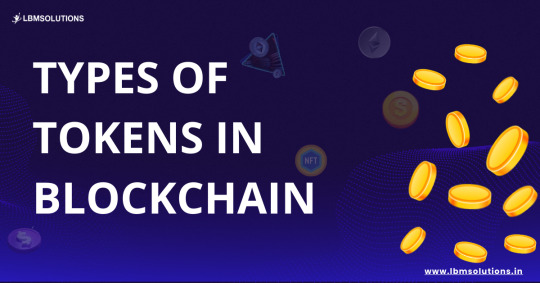
1. Utility Tokens
Utility tokens are designed to provide access to specific products or services within a blockchain-based platform. They are intended as tools for users to engage with the ecosystem, not as investments. These tokens grant holders access to particular features or services, often incentivize beneficial behaviors like staking or governance participation, and are primarily used for their intended utility rather than speculation. Examples include Ethereum (ETH), used for transaction fees and computational services on the Ethereum network, and Filecoin (FIL), used for buying and selling storage space within the Filecoin network.
2. Security Tokens
Security tokens represent ownership in underlying assets like company shares, real estate, or other investment vehicles and must comply with federal securities regulations, ensuring legal compliance. These tokens indicate equity or debt ownership, may offer dividends or interest payments to holders, and exemplify regulated digital investments. Examples include tZERO (TZROP), which offers equity in the tZERO platform, and RealT, which represents fractional ownership in real estate properties.
3. Governance Tokens
Governance tokens empower holders with voting rights on the development and operation of blockchain projects, making them crucial for decentralized autonomous organizations (DAOs) and other decentralized projects. These tokens enable holders to vote on proposals affecting the platform's future, promote decentralized decision-making processes, and are often distributed as rewards for active participation in the ecosystem. Examples include Uniswap (UNI), which allows holders to vote on protocol changes and upgrades, and Maker (MKR), which is used to vote on proposals affecting the MakerDAO ecosystem.
4. Stablecoins
Stablecoins are designed to maintain a stable value by being pegged to a reserve of assets, such as fiat currency, commodities, or other cryptocurrencies, minimizing price volatility. They are characterized by their stability (pegged to stable assets like USD or gold), utility (used for trading, remittances, and as a store of value), and backing (supported by fiat reserves, cryptocurrencies, or algorithmic mechanisms). Examples include Tether (USDT), which is pegged to the US dollar, and DAI, a decentralized stablecoin pegged to the US dollar and backed by crypto collateral.
5. Non-Fungible Tokens (NFTs)
Non-fungible tokens (NFTs) represent unique digital assets with distinct attributes, making them non-interchangeable on a one-to-one basis like cryptocurrencies. Each NFT is unique and cannot be replicated, providing verifiable ownership of digital assets such as art, music, or virtual real estate. They can be used across different platforms and ecosystems, enhancing their utility. Examples of NFTs include CryptoKitties, which are digital collectible cats with unique traits, and the Bored Ape Yacht Club, a popular collection of unique cartoon apes.
6. Asset-Backed Tokens
Asset-backed tokens are tied to physical assets like real estate, commodities, or precious metals, bridging the gap between digital and tangible assets. These tokens represent ownership in physical assets (tangibility), are linked to the value of real-world assets (value stability), and must comply with regulations governing the underlying assets. Examples include Tether Gold (XAUT), representing ownership of physical gold, and Digix Gold Tokens (DGX), where each token is backed by a gram of gold stored in a secure vault.
Conclusion
In conclusion, the diverse array of tokens in blockchain, from utility tokens facilitating platform access to asset-backed tokens bridging digital and tangible assets, reflects the innovation and utility of blockchain technology. These tokens enable transactions, governance, and value exchange within decentralized ecosystems, shaping the future of the digital economy. Through ongoing development and compliance, blockchain technology continues to evolve, offering endless opportunities for innovation and growth.
0 notes
Text

The technology stack in cryptocurrency refers to the combination of software, programming languages, frameworks, and tools used to build and maintain the blockchain network and associated applications. It encompasses various components such as the consensus algorithm, smart contract language, wallet infrastructure, and network protocols. A robust technology stack is essential for ensuring the security, scalability, and functionality of the cryptocurrency platform.
0 notes
Text

Token development
Token development involves creating digital assets on blockchain platforms, focusing on security, scalability, and compliance. This process includes designing and deploying tokens, implementing smart contracts, and ensuring adherence to regulatory standards to deliver robust and reliable digital solutions.
0 notes
Text
Empowering Innovation: Your Premier Token Development Partner
Welcome to LBM Solutions, your premier token development partner. We specialize in crafting bespoke digital assets, from utility tokens to NFTs, tailored to your vision. With expertise in smart contract development, security auditing, and compliance assurance, we ensure your tokens are innovative, robust, and legally sound. Let's turn your blockchain ideas into reality together.

0 notes
Text
what are token standards
Token standards are protocols for creating and managing tokens on blockchains, ensuring consistency and compatibility within decentralized ecosystems. They enable seamless interaction between tokens and decentralized applications across different platforms.
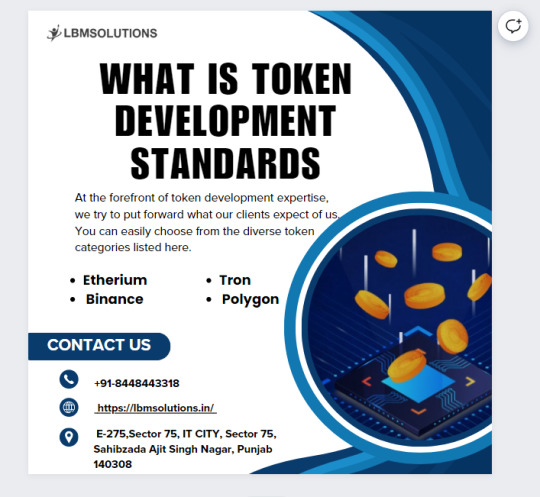
0 notes
Text
Types of crypto coin
Crypto coin encompass various types, each serving distinct purposes. Bitcoin (BTC) pioneered decentralized digital currency, prized for its scarcity. Altcoins, like Ethereum (ETH) and Ripple (XRP), offer innovations beyond Bitcoin. Tokens operate within blockchain platforms, facilitating diverse functionalities. Stablecoins, such as Tether (USDT), maintain value stability. Privacy coins, exemplified by Monero (XMR), prioritize transaction anonymity. Utility tokens, like Binance Coin (BNB), provide access to platform services. Security tokens represent real-world assets digitally. Non-fungible tokens (NFTs) tokenize unique digital assets. Each type caters to specific needs within the evolving cryptocurrency ecosystem.

0 notes
Text
The Role of Crypto Token Development Companies in Tokenization
Explore the pivotal role crypto token development companies play in the tokenization process. From initial consultation to post-launch support, see how these companies ensure the seamless creation and management of digital assets on the blockchain.
For additional information, go to:
on our website.
0 notes
Text

Cryptocoin development involves creating digital currencies on blockchain networks. This process encompasses defining, designing, coding, and launching coins, aiming to provide value and utility within the blockchain ecosystem. It requires expertise in blockchain technology, cryptography, programming, and market understanding to ensure the coin's success and adoption.
0 notes
Text
Features of crypto coin development
Crypto coin development in blockchain refers to creating new digital currencies operating on blockchain networks. It involves defining purpose, designing features, coding protocols, and launching coins. This process demands expertise in blockchain, cryptography, and programming, aiming to provide value and utility in the digital asset landscape.
The features of a crypto coin encompass a range of characteristics that define its functionality, utility, and value within the digital asset ecosystem. Crypto coin development entails creating digital currencies based on decentralized networks, primarily utilizing blockchain technology.
Cryptocurrencies boast decentralization, ensuring transactions aren't controlled by a single entity, and robust security via cryptography. They offer transparency with public ledgers and immutability for unalterable transaction records. Additionally, they have limited supply, divisibility for microtransactions, and borderless transactions. Smart contracts enable programmable functionality, extending their utility to automation and decentralized applications.
Here's a breakdown of these features:
1. Decentralization: One of the fundamental features of cryptocurrency development is decentralization. Cryptocurrencies operate on decentralized networks, typically based on blockchain technology. This means that transactions and data are distributed across a network of computers (nodes) rather than being controlled by a central authority. Decentralization ensures transparency, security, and resistance to censorship or manipulation.
2. Security: Security is paramount in crypto coin development. Cryptocurrencies use cryptographic techniques to secure transactions and control the creation of new units. Each transaction is encrypted and verified using complex mathematical algorithms, ensuring that transactions are secure, tamper-proof, and verifiable. Users have a pair of cryptographic keys: a public key, which serves as their address and is visible to others, and a private key, which is used to sign transactions and must be kept secret.
3. Transparency: Cryptocurrencies operate on public, transparent ledgers known as blockchains. All transactions are recorded on the blockchain and are accessible to anyone with internet access. This transparency ensures that transaction histories are openly available for scrutiny, promoting trust and accountability within the network.
4. Immutability: Once recorded on the blockchain, transactions are immutable and cannot be altered or deleted. Each block in the blockchain contains a cryptographic hash of the previous block, creating a chain of blocks that are linked together. This immutability ensures the integrity and permanence of transaction records, providing a reliable record of ownership and transfer.
5. Limited Supply: Many cryptocurrencies have a predetermined maximum supply, which creates scarcity and drives value. For example, Bitcoin has a maximum supply of 21 million coins. The issuance of new coins is typically governed by a predetermined schedule, such as Bitcoin's halving event, which occurs approximately every four years and reduces the rate of new coin creation by half.
6. Divisibility: Cryptocurrencies are divisible into smaller units, allowing for microtransactions and broader adoption. For example, Bitcoin is divisible into units called satoshis, with one bitcoin equivalent to 100 million satoshis. This divisibility enables users to transact with fractions of a cryptocurrency, regardless of its value.
7. Borderless Nature: Cryptocurrencies transcend geographical boundaries, enabling seamless and cost-effective cross-border transactions. Traditional financial systems often involve intermediaries, such as banks or remittance services, which can introduce delays and fees. Cryptocurrencies eliminate the need for intermediaries, allowing for direct peer-to-peer transactions across the globe.
8. Programmability: Some cryptocurrencies support programmable functionality through smart contracts. Smart contracts are self-executing contracts with the terms of the agreement directly written into code. They enable developers to create decentralized applications (DApps) that can automate a wide range of processes, from financial transactions to digital identity verification. This programmability expands the potential use cases of cryptocurrencies beyond simple peer-to-peer payments.
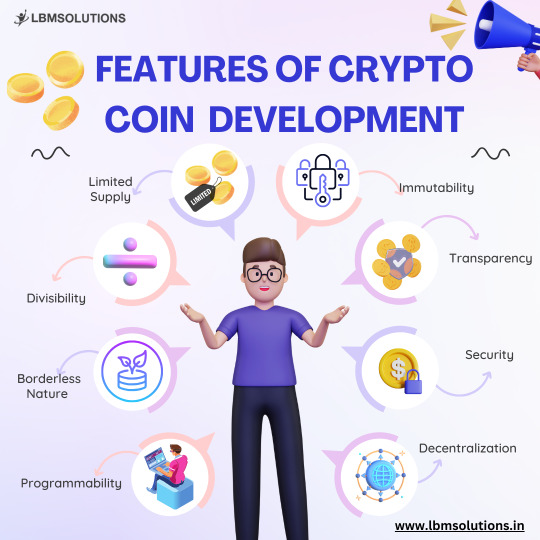
0 notes
Text
How to Create Your Own Crypto Token
The world of cryptocurrency innovation with our step-by-step walkthrough, where we demystify the process of token creation. Whether you're an aspiring developer, entrepreneur, or simply curious about the burgeoning crypto landscape,
This guide is your gateway to bringing your token idea to life. Join us as we explore the fundamentals, from understanding token standards to deploying smart contracts and fostering community adoption. Get ready to unleash your creativity and tap into the transformative power of decentralized finance (DeFi).
A Step-by-Step Guide: How to Create Your Own Crypto Token
Understand Token Standards
Begin by familiarizing yourself with token standards such as ERC-20, ERC-721, and ERC-1155. Each standard serves a specific purpose and offers unique functionalities tailored to different use cases. ERC-20 tokens are fungible and commonly used for crowdfunding and utility tokens, while ERC-721 tokens are non-fungible and ideal for representing ownership of digital or physical assets. ERC-1155 tokens provide hybrid functionalities, allowing for the creation of both fungible and non-fungible tokens within the same smart contract.
Choose a Blockchain Platform
Select a blockchain platform that aligns with your project's objectives and requirements. Ethereum is a popular choice, offering robustness, developer support, and compatibility with various token standards. Alternatively, platforms like Binance Smart Chain, Solana, and Polkadot provide distinct advantages such as lower fees and faster transactions. Evaluate factors like scalability, transaction speed, cost, and ecosystem support to determine the best platform for your token creation journey.
Design Tokenomics
Craft the economic model and mechanics that govern your token's supply, distribution, and utility within its ecosystem. Determine parameters such as total token supply, initial distribution methods (e.g., ICOs, airdrops), and mechanisms for incentivizing token holders (e.g., staking rewards, governance rights). Designing robust tokenomics is essential for creating a sustainable and balanced economic system that supports the growth and stability of your crypto token.
Develop Smart Contracts
Develop smart contracts that define the rules and functionalities of your token. Use programming languages like Solidity to code parameters such as token supply, distribution methods, and governance features. Security is paramount during this stage, so conduct thorough testing and auditing to identify and rectify vulnerabilities before deployment. Once deployed, the smart contract becomes immutable, emphasizing the importance of meticulous development to ensure reliability and functionality within the blockchain ecosystem.
Deploy and Distribute Tokens
Deploy your smart contract onto the chosen blockchain network, carefully considering transaction fees and gas optimization. Following deployment, distribute tokens according to predetermined plans, such as ICOs, airdrops, or direct sales. Transparency and fairness are essential during distribution, fostering trust and participation within the community. Provide clear instructions and guidelines for token holders to strengthen community engagement and lay a solid foundation for the token's ecosystem to flourish.
Ensure Compliance and Regulation
Ensure compliance with legal and regulatory frameworks governing token issuance, distribution, and usage. Address securities regulations, tax implications, and anti-money laundering (AML) compliance to mitigate legal risks and establish trust and credibility within the regulatory environment. Engage with legal experts to navigate the complex regulatory landscape and ensure adherence to relevant laws and regulations.
Build Community and Adoption
Finally, focus on building a vibrant and engaged community around your token. Engage with potential users, investors, and enthusiasts through social media, forums, and community channels. Transparency, regular updates, and open communication are key to building trust and credibility within the community. Incentivize participation, foster inclusivity, and involve the community in decision-making processes to cultivate a loyal and vibrant community that drives the adoption of your token forward.
Conclusion:
In conclusion, by following our step-by-step guide, you've gained the knowledge and tools necessary to navigate the intricate process of creating your own crypto token. From understanding token standards to deploying smart contracts and fostering community adoption, each stage is pivotal in transforming your token idea into a reality. Embrace innovation, prioritize transparency, and engage with your community to unlock the full potential of decentralized finance. With dedication and perseverance, you have the opportunity to contribute to the ever-evolving landscape of cryptocurrency, driving adoption and shaping the future of finance.

0 notes
Text

CRYPTO COIN DEVELOPMENT COMPANY
Crypto coin development services facilitate the creation, launch, and maintenance of digital currencies on blockchain platforms. These services cater to individuals and businesses seeking to establish their own cryptocurrencies for various purposes. From initial planning to post-launch maintenance, these services offer expertise and support
0 notes
Text
Decentralized Finance (DeFi) and Its Impact on Token Development
Decentralized Finance (DeFi) represents a rapidly growing sector within the crypto token and blockchain industry, aiming to decentralize traditional financial services by eliminating intermediaries like banks. These platforms, which are enabled by smart contracts on blockchain networks, provide a range of financial services, including lending, borrowing, trading, yield farming, and decentralized exchanges (DEXs).
By leveraging blockchain technology and smart contracts, DeFi platforms enable users to access financial services directly without the need for intermediaries, ensuring transparency, security, and efficiency in transactions. As the DeFi ecosystem continues to expand and evolve, it is revolutionizing the way individuals access and interact with financial services, democratizing access to financial opportunities, and empowering users to take control of their financial lives.
The rise of DeFi has had a significant impact on token development for several reasons:
1.Token Utility:
Token utility plays a pivotal role within the decentralized finance (DeFi) landscape, where native tokens serve multifaceted functions essential for ecosystem operation and user engagement. In the vibrant DeFi ecosystem, these tokens serve as more than mere digital currencies; they act as foundational pillars, enabling various functionalities crucial for platform governance, transaction facilitation, liquidity management, and incentivization mechanisms.
At the core of DeFi platforms lie native tokens designed to fulfill a spectrum of utility roles, ranging from governance participation to fee settlements, liquidity provision, and stake-based rewards. Governance tokens empower holders with decision-making authority, allowing them to shape the trajectory of the platform's development, propose and vote on protocol upgrades, and participate in key governance decisions.
Additionally, these tokens may serve as a means of fee payment within the ecosystem, facilitating transactions and incentivizing platform usage while contributing to the overall sustainability of the network.
2. Liquidity Mining and Yield Farming:
Liquidity mining and yield farming have become integral components of the decentralized finance (DeFi) landscape, incentivizing users to contribute liquidity to various platforms. These mechanisms offer rewards, typically in the form of tokens, to users who provide liquidity, thereby enhancing the efficiency and depth of liquidity pools within DeFi ecosystems. This process, known as liquidity mining or yield farming, has gained immense popularity as an effective means of distributing tokens and kickstarting liquidity for emerging DeFi projects.
In liquidity mining, users deposit their assets into liquidity pools or decentralized exchanges, effectively supplying liquidity to the platform. In return for their contributions, users receive rewards in the form of tokens, distributed according to predefined rules and algorithms. Similarly, yield farming involves users staking their assets in DeFi protocols to earn rewards, which can include additional tokens, protocol-generated fees, or other forms of incentives.
3. Interoperability:
Interoperability stands as a cornerstone principle within the decentralized finance (DeFi) ecosystem, facilitating seamless interactions and transactions across multiple blockchain networks. As DeFi continues to expand its reach and influence, interoperability between different protocols becomes increasingly crucial for ensuring a cohesive user experience and effective liquidity aggregation. This interoperability empowers users to seamlessly navigate between various DeFi platforms, access diverse financial services, and interact with a wide array of tokens and protocols, regardless of the underlying blockchain network.
Token developers play a pivotal role in driving interoperability within the DeFi landscape by prioritizing features that enable their tokens to seamlessly integrate into different platforms and interact with other tokens and protocols.
Additionally, prioritizing interoperability features enables tokens to leverage the full potential of the broader DeFi ecosystem, fostering innovation, collaboration, and interoperability across decentralized finance platforms. Ultimately, interoperability serves as a catalyst for driving the continued growth and evolution of the DeFi space, enabling users to unlock new levels of accessibility, liquidity, and functionality across multiple blockchain networks.
4. Community Governance:
Community governance is a fundamental aspect of decentralized finance (DeFi), wherein a collective of token holders exercises oversight and decision-making authority over various aspects of DeFi systems. Utilizing decentralized governance techniques, such as on-chain voting mechanisms and governance proposals, token holders actively engage in shaping the direction and evolution of DeFi protocols.
Participatory governance allows for a transparent and community-driven process of decision-making for protocol upgrades, parameter adjustments, and Treasury cash allocations.
Moreover, token developers must prioritize the decentralization of governance processes, fostering inclusivity and transparency while mitigating the risk of centralization. Through effective community governance, DeFi platforms can harness the collective wisdom and expertise of their token holders, driving innovation, resilience, and trust within the decentralized finance space.
Conclusion :
In conclusion, Decentralized Finance (DeFi) has left an indelible mark on token development, reshaping the landscape of the cryptocurrency and blockchain industries. The evolution of DeFi platforms has democratized access to financial services, removing the need for traditional intermediaries and empowering users to take control of their financial lives.
The impact of DeFi on token development is multifaceted, with tokens assuming critical roles in governance, liquidity provision, and incentivization mechanisms within DeFi ecosystems. Liquidity mining and yield farming have emerged as integral components of DeFi, incentivizing users to contribute liquidity and bootstrapping ecosystem growth.
As DeFi continues to evolve, its impact on token development will remain profound, driving innovation, accessibility, and community-driven governance within blockchain ecosystems.
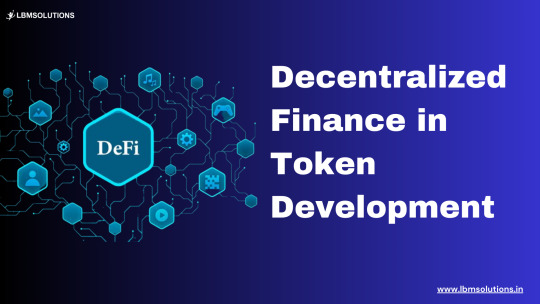
0 notes
Text

Key Steps in ERC-20 Token Development
ERC-20 token development refers to the process of creating and deploying tokens on the Ethereum blockchain according to the ERC-20 token standard. This standard defines a set of rules and functions that tokens on the Ethereum network must adhere to in order to be considered ERC-20 compliant. These rules include functions such as transferring tokens between addresses, checking the balance of tokens, and approving token transfers.
0 notes
Text
The Role of Smart Contracts in Token Development: Insights from Experts
Smart contracts are the backbone of modern token development, revolutionizing the way digital assets are created, managed, and executed on blockchain networks. These self-executing contracts, encoded with predefined rules and conditions, automate transactions and agreements without the need for intermediaries, ensuring security, transparency, and efficiency. In the dynamic landscape of token development, smart contracts play a pivotal role in facilitating various functionalities such as token issuance, transfer, and governance.
What is a crypto token?
A crypto token is a digital asset operating on a blockchain network, representing value or utility within its ecosystem. Built on existing blockchain platforms, tokens adhere to specific standards and facilitate transactions, investments, and access to services, offering flexibility and convenience in the digital economy through trading and storage in digital wallets.
The process of crypto token development involves creating these digital tokens on blockchains such as Ethereum or Binance Smart Chain, serving diverse purposes such as transactions and network governance. Beginning with conceptualization, the development journey progresses through smart contract development, design, and compliance to ensure adherence to standards and regulations.
Comprehensive security audits are conducted to mitigate vulnerabilities before deployment, with ongoing governance and maintenance post-deployment ensuring the integrity of the token. Ultimately, crypto token development enables the creation of customized digital tokens, driving innovation within decentralized ecosystems.
Why smart contact is necessary for "Token Development "
Smart contracts are integral to token development, automating and enforcing the rules governing tokens on blockchain networks. Without smart contracts, managing tokens would be cumbersome, requiring manual intervention for each transaction or operation. By utilizing smart contracts, token developers can automate various functionalities such as issuance, transfer, and redemption, streamlining processes and reducing the risk of errors.
Moreover, smart contracts enhance security and transparency in token development, operating on immutable blockchain networks to ensure that transactions are transparent and tamper-proof. This transparency fosters trust among users and stakeholders, as they can independently verify the integrity of token operations. Overall, smart contracts are indispensable tools in token development, empowering developers to create secure, efficient, and transparent token ecosystems within decentralized networks.
Role of Smart Contracts in Token Development:
1. Understanding Smart Contracts: Smart contracts are self-executing contracts with predefined terms written into code. They automate the execution of agreements and transactions on blockchain networks, removing the need for intermediaries and enhancing security and efficiency.
2. Token Conceptualization: This initial step involves defining the purpose and objectives of the token. It requires identifying the utility or value the token will represent, its intended use case, target audience, and how it will fit into the broader blockchain ecosystem.
3. Smart Contract Development: Smart contract development entails coding the rules and functionalities of the token into a smart contract. Developers use programming languages like Solidity to create the code, specifying parameters such as token issuance, transfer, and other functionalities.
4. Testing and Auditing: Thorough testing and auditing of the smart contract code are essential to identify and mitigate potential vulnerabilities or bugs. This step ensures the security, functionality, and reliability of the smart contract before deployment onto the blockchain network.
5. Deployment and Governance: Once the smart contract has been tested and audited, it is deployed onto the blockchain network. Governance mechanisms, such as decentralized autonomous organizations (DAOs) or community voting systems, may be implemented to manage the token ecosystem, make decisions, and update the smart contract as needed.
6. Token Integration: After deployment, the token is integrated into decentralized applications (DApps) or platforms where users can interact with it according to its intended use case. This integration enables users to transfer, trade, or utilize the token within the ecosystem.
7. Ongoing Maintenance: Continuous monitoring and maintenance of the smart contract and token ecosystem are crucial to ensuring its integrity, security, and functionality over time. Regular updates, security patches, and governance decisions may be necessary to address evolving needs and challenges.
In conclusion, smart contracts are a game-changer in the world of token development, providing the foundation for creating, managing, and interacting with digital assets on blockchain networks. Their role in defining token behavior, ensuring security, automating processes, and enabling advanced use cases underscores their significance in shaping the future of blockchain technology.
As the blockchain ecosystem continues to evolve, smart contracts will remain at the forefront of innovation, driving transformative changes and unlocking new opportunities for decentralized applications and tokenized ecosystems.
0 notes
Text
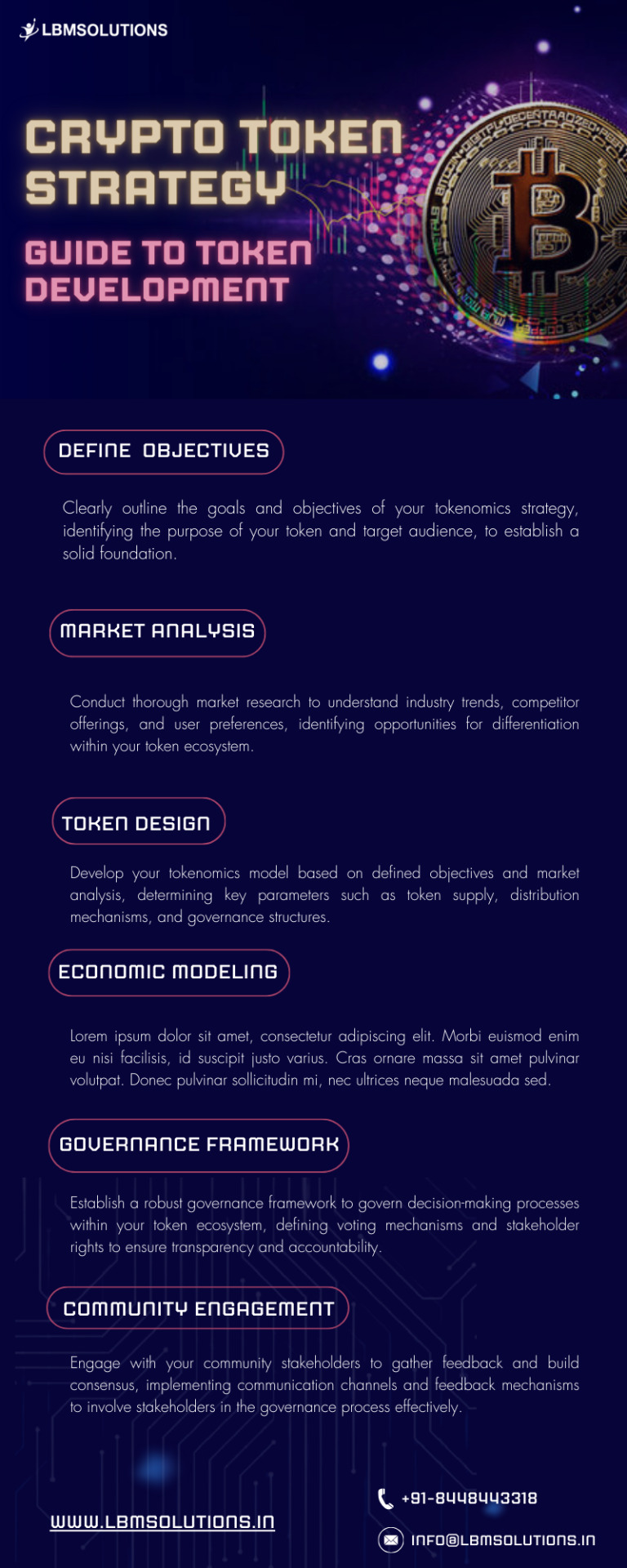
Unlock the confidence to successful token development with our Crypto Token Strategy Guide. Explore essential insights and reliable strategies to navigate the complexities of token creation, from concept to deployment. Whether you're a novice or experienced developer, our guide empowers you with the knowledge and tools needed to craft effective token strategies that drive success in the dynamic world of cryptocurrency.
0 notes
Text

Unlock the potential of blockchain technology with our Crypto Token Development Company. Our expert team specializes in crafting custom digital assets tailored to your unique needs. From conceptualization to deployment, we guide you through every step of the process, ensuring seamless integration and optimal performance for your project. With our comprehensive range of services, including smart contract creation, token design, and deployment across various blockchain platforms, we empower you to realize your digital vision with confidence. Partner with us today and take your project to new heights in the world of decentralized finance.
0 notes